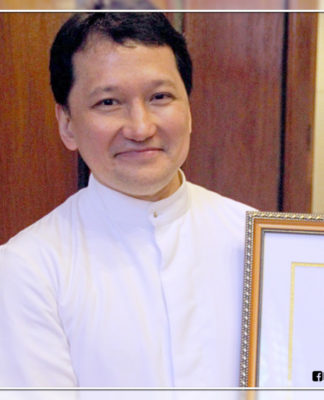THE CENTRAL Student Council (CSC) submitted for final approval the revised UST Students’ Code, formerly known as Magna Carta of Students Rights, to Rector Fr. Rolando de la Rosa, O.P. last November 13.
CSC president Jeanne Luz Castillo said they incorporated more “Thomasian feel” to the code after it was submitted to different college heads and administration officials for comment during the school year 2007-2008.
“Probably, [the students’ code] was not placed on top of the administration’s priority list because the students are generally happy in the University,” Castillo said, noting the five-year delay of the approval.
The draft code, a copy of which was obtained by the Varsitarian, was originally titled “Students’ Magna Carta.” But in 2007, the Academic Senate, Council of Regents, and the Board of Trustees asked the CSC to rename it to UST Students’ Code because the term “Magna Carta” is a bit “drastic” or “offensive.”
The Magna Carta is the famous document issued by King John at Runnymede under compulsion from the barons and the Church in 1215. The United States Constitution, Bill of Rights, and Declaration of Independence are modeled after the Magna Carta, which was the first to assert that no man, not even the king, is above the law.
Castillo said comments raised by University officials were “minimal,” such as the rephrasing of provisions and addition of clauses.
The code was also “vague” in provisions Article 2, Section 6, or the right to information about the course; Section 7, or the right against unreasonable deadline requirements; and Section 9, or the right to receive just and reasonable grade.
Section 6 of the original Student Magna Carta, which stated the right of students to meet their professors every class for the entire semester, was retained in the revised student code.
Education Dean Clotilde Arcangel commented on the draft that the provision conflicted with the collective bargaining agreement between the faculty and the administration, because professors are also required to attend seminars and co-curricular activities that will “compel them to miss their classes from time to time.”
Also commenting on the draft, Tourism and Hospitality Management Dean Ma. Cecilia Tio Cuison and former Accountancy dean Jose Ireneo asked, “Who determines the unreasonable?” with respect to the provision stating that “students have the right against unreasonable deadlines and requirements.”
Castillo said the Academic Senate, Board of Trustees and the Council of Regents would treat incidents on a “case-to-case basis” and judge what is “unreasonable” and what is not.
The right to receive just and reasonable grade was re-focused to “students have the right to receive a grade based solely on fair evaluation of their performance” from “students have the right to be informed of their class standing.”
This is to guard students from the “whims or caprices of professors,” who may grade them unfairly, Castillo said.
In the original draft of the students’ code, Article 8, Section 1 stated: “the University guarantees the rights of students against any form of unreasonable searches…” to which vice Rector Fr. Pablo Tiong, O.P. commented: “If malls do it, why not schools?” Still the provision was included in the revised code.
Meanwhile, former assistant to the Rector for student affairs Cristina Cabral said it was “logistically impossible” to evaluate all professors at the end of every semester, expressing reservations on Section 10b that said at least 50 percent of the total rating of the faculty evaluation should come from students’ evaluation of their professors.
“[But] the results of faculty evaluation are confidential,” Tiong said.
Tiong, Cabral, former secretary general Fr. Isidro Abaño, O.P., Ireneo, Arcangel, Tio Cuison, Health Service Director Dr. Maria Salve Olalia, Rehabilitation Sciences Regent Fr. Fausto Gomez, O.P., Faculty of Civil Law professor Arnold Cacho, and former assistant to the Rector for planning and development Marilyn Mabini examined the code.
Castillo said the CSC would follow up on the proposal within the month and “hopefully, be able to have a dialogue with the Rector regarding it.” Jilly Anne A. Bulauan and Darenn G. Rodriguez
















